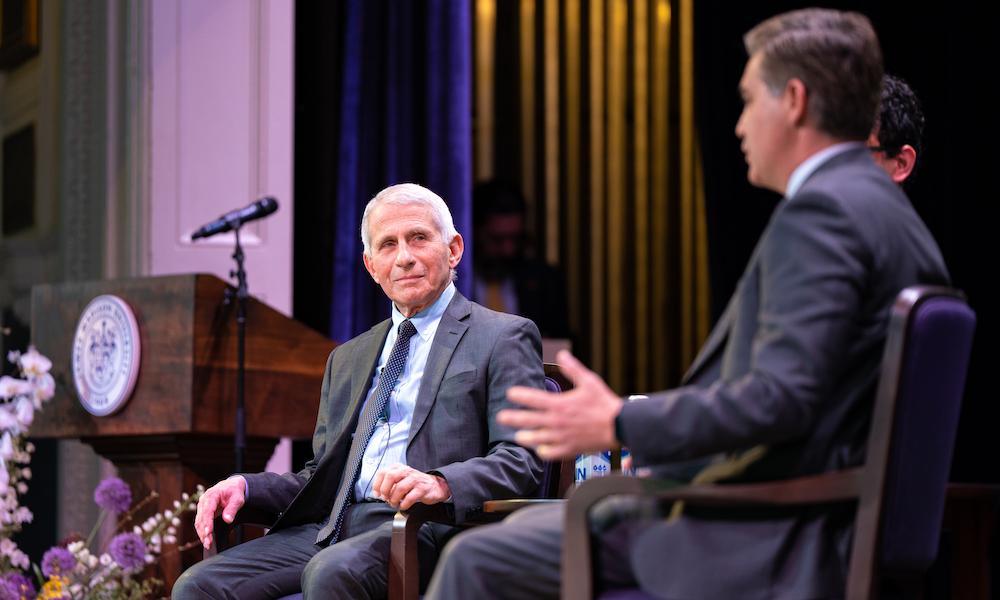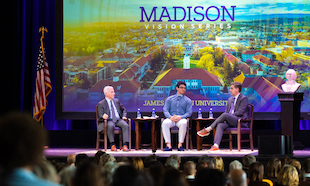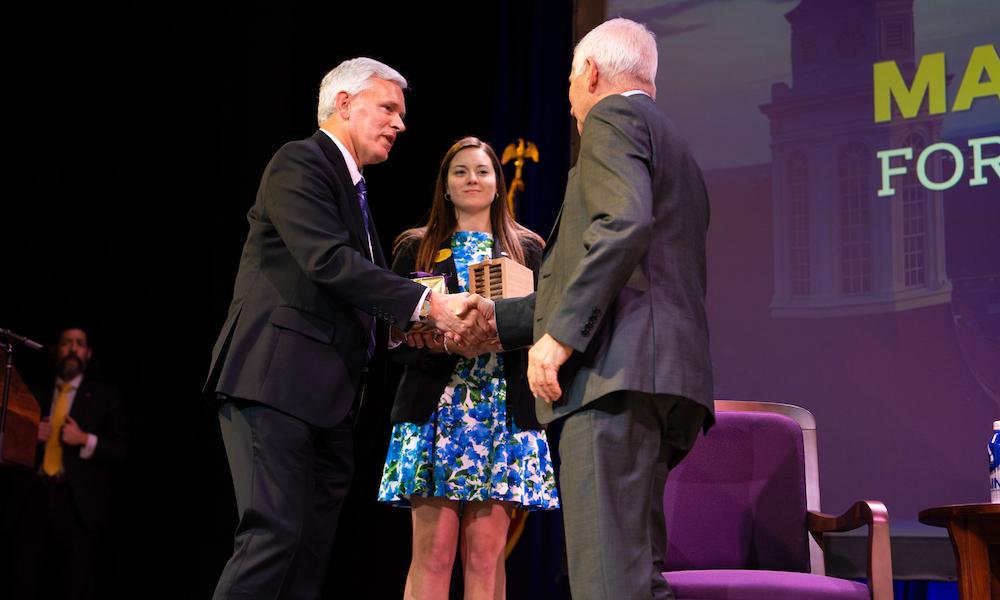Fauci defends COVID-19 decisions during Madison Vision Series event
Nation and World
SUMMARY: The final Madison Vision series event of the 2022-23 academic year featured Dr. Anthony Fauci, one of the country's leading experts on infectious diseases, and JMU alumnus and CNN weekend anchor Jim Acosta ('93). Most of the dialogue revolved around Fauci’s experience as chief public health adviser during the COVID-19 pandemic.
More than three years after the start of the COVID-19 pandemic, Dr. Anthony Fauci, one of the country’s leading experts on infectious diseases, stands by the U.S. government’s decision to shut down schools, businesses and institutions in the hope of suppressing the spread of illness before it overwhelmed the hospital system.
Watching how Italy’s hospitals were on the verge of being overrun by an influx of COVID-19 patients, U.S. officials weighed the risks of our hospitals seeing the same outcome and, in a worst-case scenario, having to choose between which patients live and which ones die.
“That is something you never, ever want to be in a position to have to do as a physician, and that was going on in Europe,” Fauci said during a town hall session with JMU alumnus and CNN weekend anchor Jim Acosta (’93) at Wilson Hall.
Recalling those early days of 2020, Fauci said it wasn’t easy to be the one to encourage former President Donald Trump to shut down schools and businesses, while instructing Americans to stay home for 15 days and knowing that another 30 days would likely follow. But it was necessary.
“There were economic consequences of that,” he said. “You don’t want to keep kids out of school, but you have to make a balance. … The initial decision, by anybody’s reckoning, was the right decision. Otherwise we would have had overrunning of our hospital system. … And to his credit, we convinced the president, and he agreed that that’s what we were going to do.”
The town hall, the final Madison Vision Series event of the 2022-23 academic year, was well attended by students, staff and the community.
Acosta and Hugh McFarlane, an Honors student in the College of Health and Behavioral Studies who plans to pursue a career in medicine, questioned Fauci about his nearly 40 years as director of the National Institute of Allergy and Infectious Diseases, including his role as key adviser to seven U.S. presidents on global HIV/AIDS issues, and initiatives to bolster public health preparedness against emerging infectious disease threats, such as Zika, Ebola, pandemic influenza and various coronaviruses.

Most of the dialogue throughout the nearly 90-minute session, including questions from audience members, revolved around Fauci’s experience during the COVID-19 pandemic that caused widespread shutdowns in the U.S. and around the world starting in early 2020.
Acosta, who previously served as CNN’s chief White House correspondent during the Obama and Trump administrations, asked Fauci when he realized how extraordinary a situation the spread of the novel coronavirus was becoming.
“[It was] an evolution of a process that was a rapidly moving target,” Fauci said.
In January and early February 2020, he and his colleagues thought that COVID-19 would act like SARS CoV-1, which they encountered nearly 20 years earlier.
“It was the same thing; it was a coronavirus,” Fauci said. “We knew it jumped from a bat to a [palm] civet cat to a human in China, and it started to spread outside, but in a very inefficient way. There were a total of about 8,000 cases in the world and 781 deaths in the world. So, in the very beginning, we felt if we did isolation, identification, contact tracing, we could contain it.”
But COVID-19 didn’t act that way. As of April 5, more than 40 months after the start of COVID-19 at the end of 2019, the World Health Organization reports 762,201,169 confirmed cases worldwide, including 6,889,743 deaths. More than 13 billion doses of the COVID-19 vaccine have been administered as of April 2, according to WHO.
Additionally, Fauci said the virus continues to elude experts who have yet to prove how it started.
Whether it came from a lab leak, the DNA of illegally held raccoon dogs in an Asian wet market mixing with the RNA of the virus, or a natural jump in the evolution of illness, “We don’t know,” he said. Any suggestions so far rely on circumstantial evidence, “not definitive proof,” he said, so it’s essential for scientists to keep an open mind.
|
”Disinformation and misinformation is the bona fide enemy of public health. We should embrace differences in opinion. … There are better angels in each of us.” — Dr. Anthony Fauci |
Fauci admitted that he didn’t realize the importance of masking early on, and if he had it to do over again, he would have urged universal masking from the start. One reason for the miscalculation, he said, is that health experts didn’t realize the virus would be transmitted so easily, particularly from people who weren’t yet showing symptoms.
Asked by McFarlane how U.S. and other global medical experts let a disease of such severity evade notice before it reached pandemic levels, Fauci didn’t have a simple answer.
“Spillovers from animal to human occur every single day, by the thousands,” he said. Usually they’re “one-offs” or can be managed without affecting the larger population, such as the bird flu or the swine flu. About 75% of all new infections are zoonotic and come from animal to human crossover, Fauci said.
The success story of COVID-19, he said, was that the U.S. government was able to invest in the biomedical research to create a vaccine that exceeded any previous expectation of being developed, tested and released to the public in about 11 months, when typically it would have taken seven years.
One of the tragedies of COVID-19, he said, is the public health response, which has led to widespread false information online and by word-of-mouth.
“Disinformation and misinformation is the bona fide enemy of public health,” Fauci said. “We should embrace differences in opinion. … There are better angels in each of us.”
 |
| President Alger presents Fauci with the 2023 Madison Award for Public Good as JMU student Olivia Luke, who helped create an original work of art as a gift to Fauci, looks on. |
Asked by an audience member what he would tell those who doubt his public statements throughout the pandemic or the honesty of government health organizations, Fauci challenged skeptics to offer specific cases in which he lied and provide specific data to support their claims.
“I can defend everything I’ve said in the public health arena,” he said. However, “If you disagree with me, I will respect that if you show me the data.”
Later, asked how he stays grounded in the face of public dissent, Fauci said he focuses on his mission “to preserve and protect the health of the American public.”
“My responsibility is to save lives,” he said. “Everything else is noise.”
After the event, JMU President Jonathan R. Alger presented Fauci with the 2023 Madison Award for Public Good and gave him a trophy-size seed library containing 10 species of native Virginia plants, an original work from JMU art student Olivia Luke and sculpture professor Greg Stewart made from red oak and other materials they found in the studio.
